
A brief #irantalks reflection: With benefit of some hindsight and (incomplete) information, it’s become clearer that two of the key assumptions undergirding the IRGC FTO debate earlier this spring were wrong or, at best, incomplete.
(1/9)
(1/9)
(1) Iran would not accept a deal that didn't include FTO removal.
--It was a "red line" & "must have."
--IRGC's heft within the Iranian system meant negotiators had no room to move.
--Tehran wasn't likely to blink, and the US would have to remove it if it wanted a deal.
(2/9)
--It was a "red line" & "must have."
--IRGC's heft within the Iranian system meant negotiators had no room to move.
--Tehran wasn't likely to blink, and the US would have to remove it if it wanted a deal.
(2/9)
Based on the latest reports from the negotiations, Iran has backed off the FTO demand, and Iranian media and officials have tried to reframe the issue as one that could be addressed in the future.
The supposedly immutable Iranian position shifted substantially.
(3/9)
The supposedly immutable Iranian position shifted substantially.
(3/9)
(2) FTO was the only thing standing in the way of a deal.
--The US needed to give on the FTO because, with it resolved, a deal would be done.
(4/9)
--The US needed to give on the FTO because, with it resolved, a deal would be done.
(4/9)
As the past week has shown, the IAEA Safeguards probes have risen to paramount importance. It’s not hard to imagine that these would’ve be lurking nearby if FTO was removed.
(5/9)
(5/9)
Of course, that’s a counterfactual. Another counterfactual could be that a breakthrough on FTO could’ve created enough momentum that Iran would’ve decided to actually implement March joint statement.
We don’t know. But the storm over the past few days makes me skeptical.
(6/9)
We don’t know. But the storm over the past few days makes me skeptical.
(6/9)
The Iranian reversal on FTO has seemingly been repeated with guarantees, which had been a prominent public demand (as recently as Doha round) but now appears to have fallen by the wayside.
That said, I am less confident that the guarantees issue won't rear its head again.
(7/9)
That said, I am less confident that the guarantees issue won't rear its head again.
(7/9)
What does this mean for Iran's seemingly final "red line," the SG probe?
On its face, SG issue seems more complex than FTO or guarantees, and the broader environment today is overall worse than 6 mo ago--which makes me skeptical that a deal is ultimately doable.
(8/9)
On its face, SG issue seems more complex than FTO or guarantees, and the broader environment today is overall worse than 6 mo ago--which makes me skeptical that a deal is ultimately doable.
(8/9)
But, ultimately, it's a sign that we should be analytically humble about taking at face value where red lines lie.
Recall that the JCPOA itself appeared to cross most or all of the red lines Iran had publicly articulated.
(9/9)
Recall that the JCPOA itself appeared to cross most or all of the red lines Iran had publicly articulated.
(9/9)
• • •
Missing some Tweet in this thread? You can try to
force a refresh






